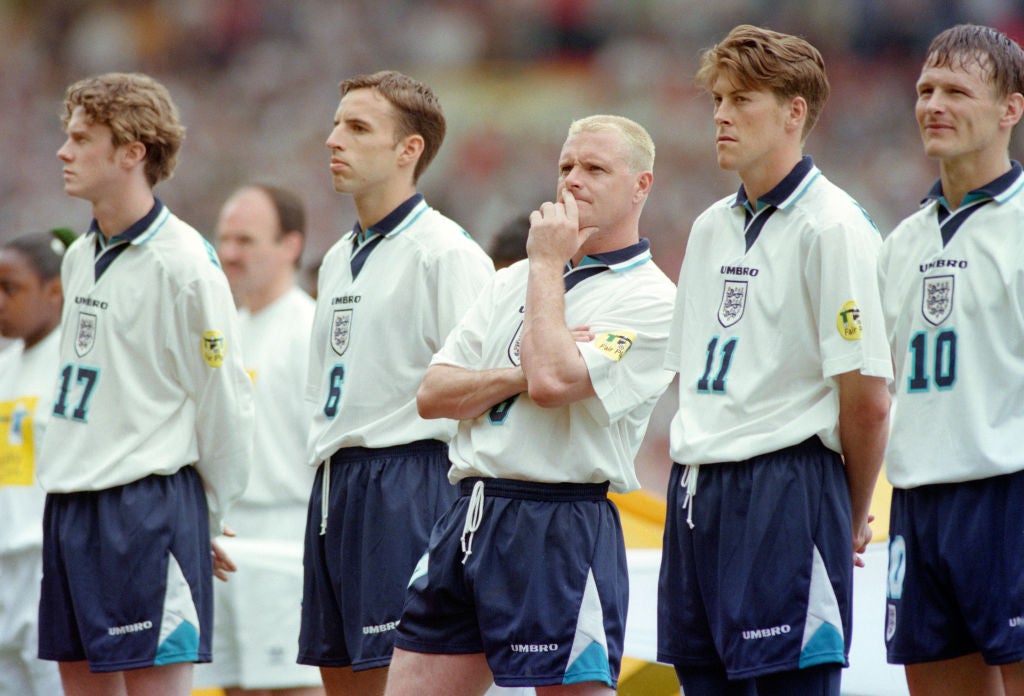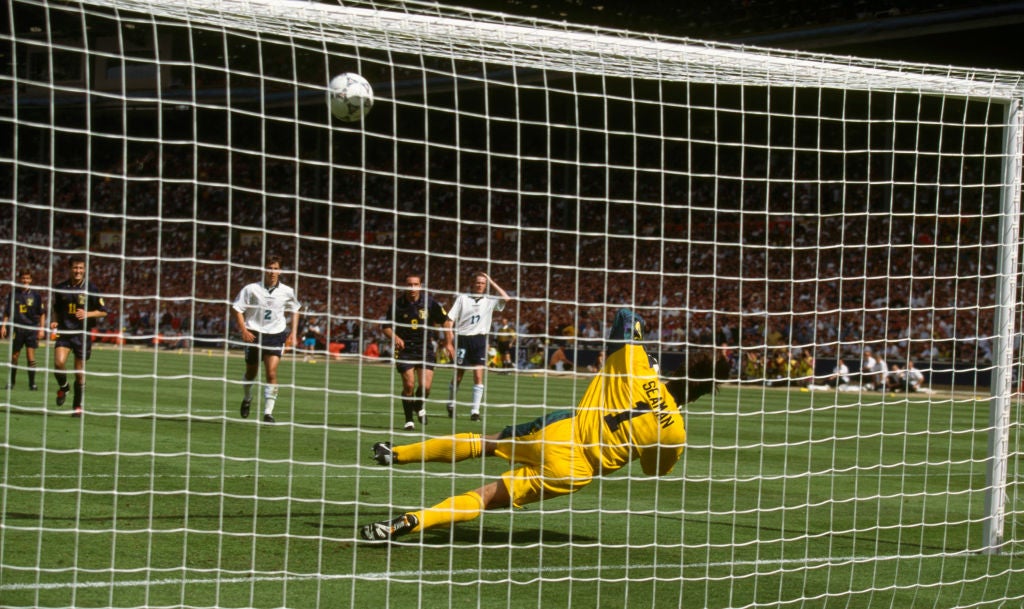The ‘magic’ 60 seconds of Euro 96 which changed England’s tournament
Darren Anderton played on that famous afternoon and Wembley and tells The Independent about the goal which defined an England generation
“It’s nuts how quickly your emotions can change – that one minute pretty sums up the magic of football for me.”
Under sunny Californian skies, Darren Anderton has taken a break from changing nappies to reflect on a match that changed the course of Euro 96, and sent him and his team-mates on a journey that, even 25 years on, still maintains an air of magic.
Then with Spurs, Anderton was part of the last England side to meet Scotland at a major tournament. And on a blisteringly hot Wembley day, he experienced pretty much every emotion the sport has to offer in a pulsating second half that illustrated just how quickly fortunes can change at a major tournament.
A turgid first half – the half-time rendition of Rocking All Over The World by the Tartan Army was far more entertaining – was followed a second 45 minutes that no-one on either side of the border will ever forget.
Including those on the Wembley turf.
“The performance against Holland is one that always sticks out but that Scotland game was probably the most pressure any of us faced in our entire careers,” he says.
“There’s importance to every game but there was pressure because of the performance against Switzerland, it was Scotland, and if we got beat we were probably going out. As a group of players we faced being ridiculed by the press for years to come - it would have been a nightmare.
“But the whole tournament changed within that one minute from Dave Seaman saving the penalty to Gazza’s moment of genius.”
If ever 60 seconds of football encapsulated the magic of football – although less so if you’re of a Scottish persuasion – it was those that occurred between minutes 78 and 79 under a scorching mid-summer English sun.
A penalty to Scotland was taken by Gary McAllister and saved by Seaman. England then broke to score perhaps the most fabled major tournament goal since Geoff Hurst’s disputed third in the 1966 World Cup final.
“I passed ball to Gazza and even within the game it seemed like it was slow motion,” he says. “You think he’s going to hit it first time with his left foot on the volley, which he’s more than capable of doing.
“Then a bit of magic, flicking it up in the air. I’m not kidding, everything turned to slow motion, it was just so bizarre. As the ball comes back down, you know there’s only one place it’s going to end up. Then the celebration and everything else. Magical.”

It was football’s ultimate sliding doors moment. McAllister scores the penalty and the game finishes 1-1, England go into their final match against the Netherlands knowing that only three points would do. The hand-brake would be well and truly on.
As it was, that second goal meant that qualification for the knockout stage was virtually assured, leaving Alan Shearer and Teddy Sheringham to run amok against the Dutch in one of the great England displays just four days later.
The travelling Scottish fans, meanwhile, were left to lament what might have been. Resigned to the fact that Gazza’s goal would be replayed ad nauseam whenever the two teams met again.
“There was definitely relief after that goal, just to go 2-0 up, took a weight off everyone’s shoulders,” says Anderton. “We got abused after the Switzerland game and if you think about it, the Scotland game was almost déjà vu. We went 1-0 up, they started to come back into the game, we got a bit edgy, the crowd got a bit edgy and before you know it we’ve given another penalty away.

“It was like, oh my Lord, we’ve done it again – we’ve thrown it away, here comes the abuse again.
“It’s just incredible how different you can feel within a minute.
“After that, you’re sat in the changing room, you know you’ve done your job and the whole confidence within the team just sky-rocketed.”
On the terraces, there was a similar feeling of relief mixed with unbridled joy. Disaster hadn’t just been averted; it had been dismissed entirely. Whisper it quietly, but two years after missing out on qualification for the World Cup in the USA, England fans began to think that they might just get to enjoy a major tournament.
“After the game, the fans stayed on the terraces and the song comes on – that defines the tournament for me, that one moment. To be part of that was amazing, to see it first hand was incredible. This game will be very special for everyone involved. Another 2-0 would suit me down to the ground.”
Join our commenting forum
Join thought-provoking conversations, follow other Independent readers and see their replies
Comments
Bookmark popover
Removed from bookmarks